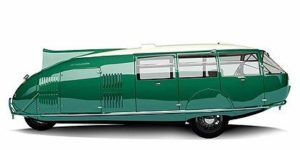
Did you know that Bridgeport was once the home of “the car of the future”? It was the Tesla of its era, but only three were ever built.
This mystery vehicle? The Dymaxion Car. The designer? Buckminster Fuller.
Best known for his pioneering 1940s architectural design of the geodesic dome, a decade earlier Fuller was already inventing other things. It was the 1930s and the country was struggling through the Depression. Fuller saw the need for innovation, for “doing more with less,” and conceived of a mass-produced, pre-fabricated circular house modeled after a grain silo.
Built with aluminum, Fuller only saw two prototypes of the dwelling constructed and even those weren’t actually built until 1945. Fuller called his design The Dymaxion House … Dy for Dynamic, Max for Maximum and Ion for tension.
It was a major flop.

Next, Fuller moved on to transportation, conceiving the Dymaxion Car, an 11-person, three-wheeled vehicle that he hoped might one day would even be able to fly using what he called “jet stilts”… and this was decades before the invention of the jet engine.
Indeed, the Dymaxion Car looked a lot like a stubby zeppelin with a forward-facing cockpit and tapered, aerodynamic tail. Equipped with a rear-mounted engine that could run on alcohol, it could go 90 mph and get 30 miles to the gallon. The car had dual steel frames while a wooden lattice-work held the outside aluminum panels in place. The single rear wheel could pivot 90 degrees making parking a breeze.
Bankrolled with $5000 from wealthy investor and socialite Philip Pearson of Philadelphia, Fuller needed a place to build a prototype and ended up at the old Locomobile plant on Atlantic Street in Bridgeport’s Tongue Point neighborhood. Don’t bother looking for this piece of history. It’s long gone as the land is now home to the PG&E power plant.
When Fuller set up the auto workshop in March 1933, he hired naval architect Starling Burgess, who recruited 27 workmen, many of them from Rolls Royce, from the 1,000 applications he received. In just three months, the first prototype was completed and rolled out onto the streets of Bridgeport on Fuller’s 38th birthday. The car was immediately shipped to Chicago for display at the World Fair.
Sadly, the prototype was totaled after it was involved in a car crash, flipped over and killed its driver and left VIP passengers injured. Initial orders for the Dymaxion started to evaporate over safety fears even though it turns out the Fuller car had been sideswiped.
A second prototype emerged from the Bridgeport plant six months later. Fuller had hoped to display the Dymaxion at the 1934 New York Auto Show but pressure from Chrysler locked him out, literally. Not to be outdone, Fuller parked prototype #2 right by the front door of the show and got more attention than he might have done on the exhibit floor.
Fuller even brought the car back for the last year of the Chicago World Fair in 1934 but public curiosity didn’t turn into sales. Fuller eventually sold this second prototype to his plant workers while a third model — this one equipped with a stabilizing vertical fin — went to conductor Leopold Stokowski.
Only one of the three Dymaxions survived, car #2, which is now at an auto museum in Reno, NV. But Bucky Fuller fans have built replicas, some of which are still on the roads today 80 years later.
Posted with permission of Hearst CT Media.
About the author: Jim Cameron is founder of The Commuter Action Group, and a member of the Darien RTM. The opinions expressed in this column are only his own. You can reach him at CommuterActionGroup@gmail.com For a full collection of “Talking Transportation” columns, visit www.talkingtransportation.blogspot.com